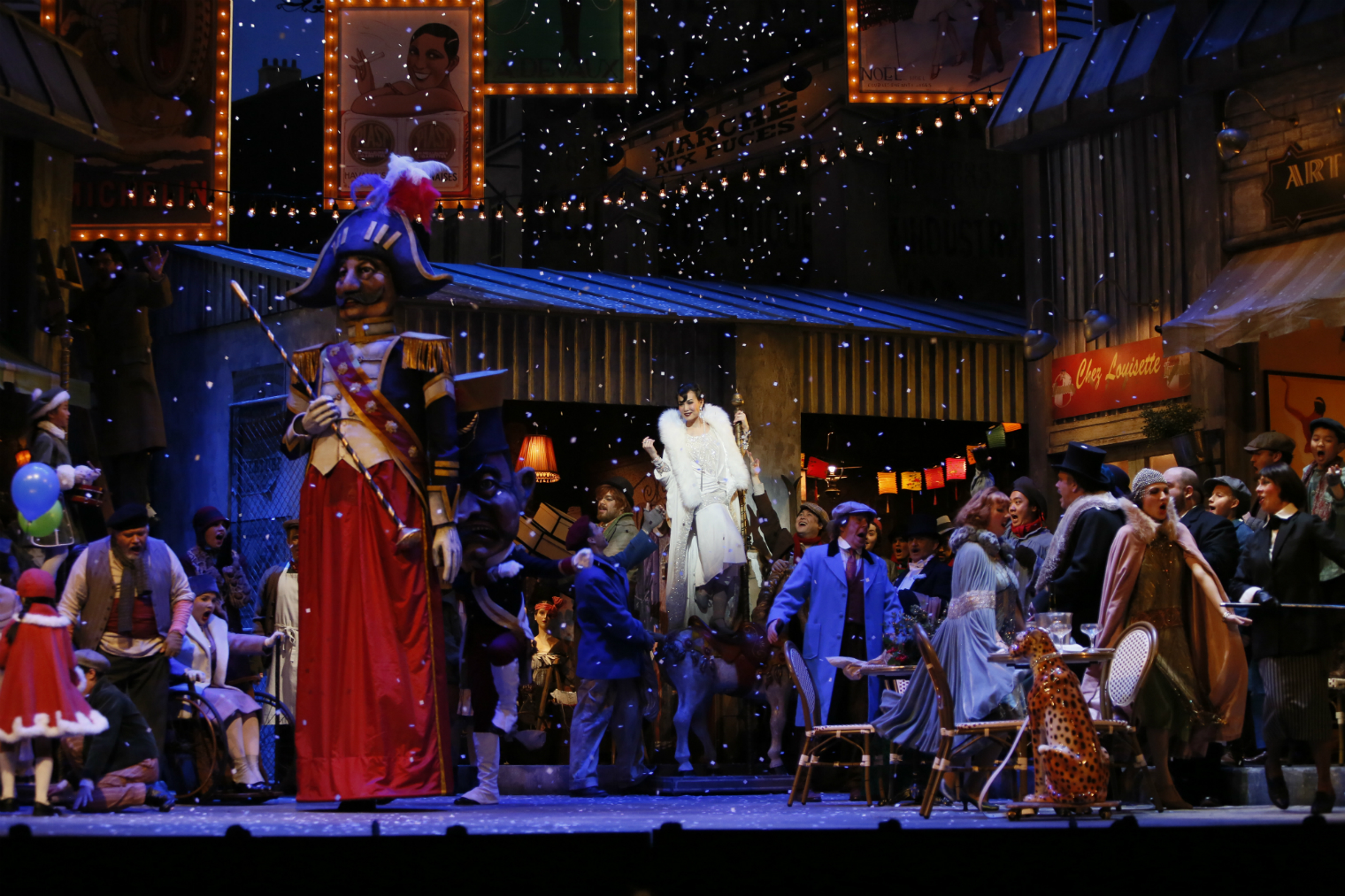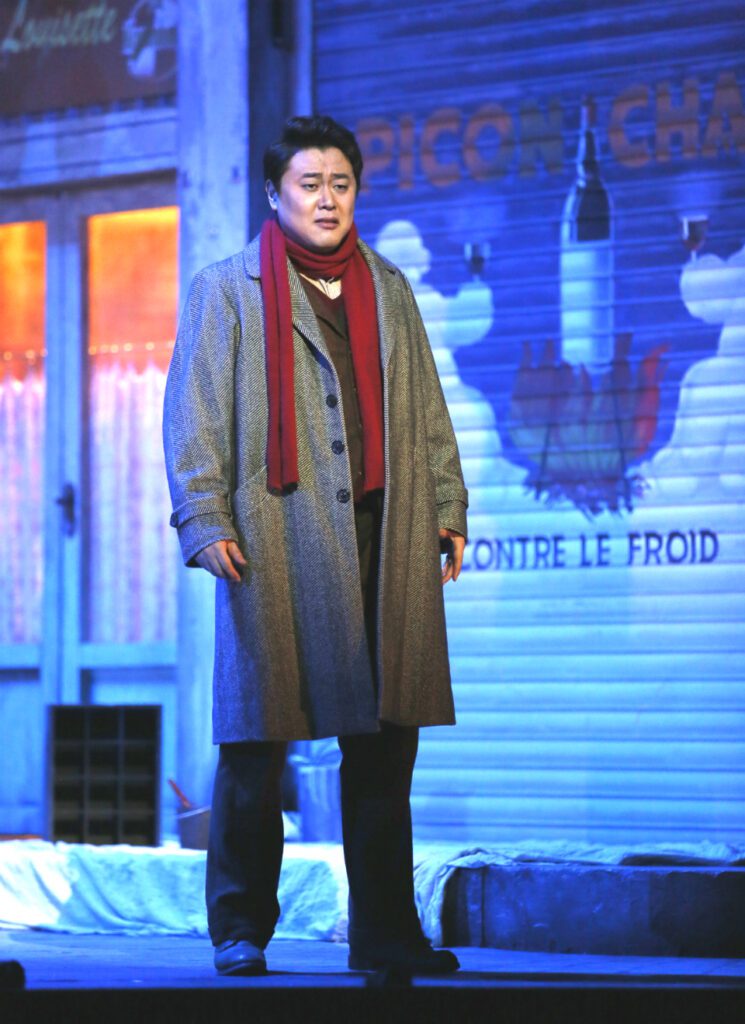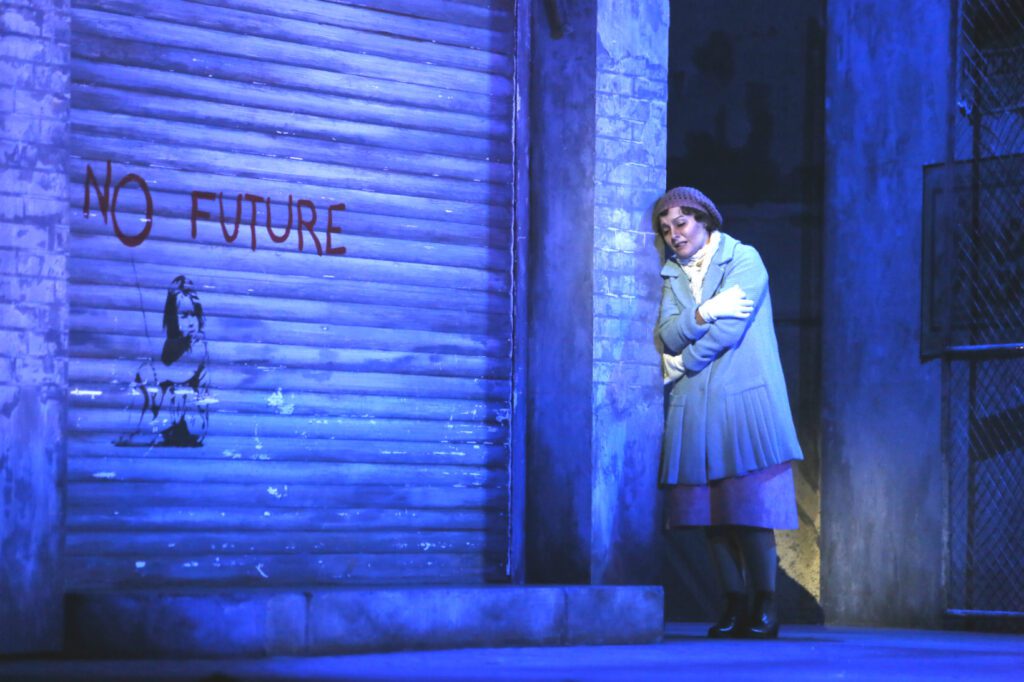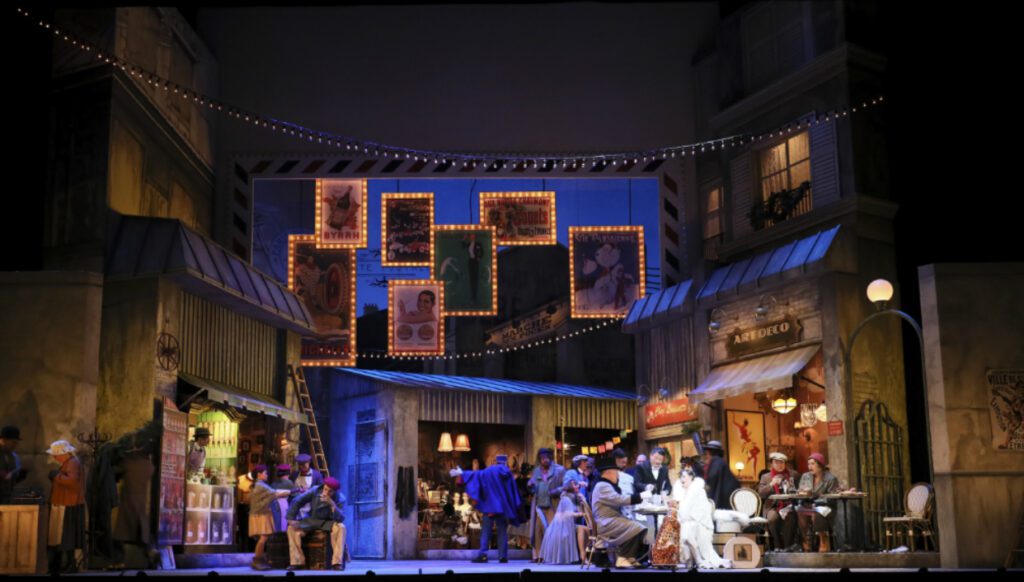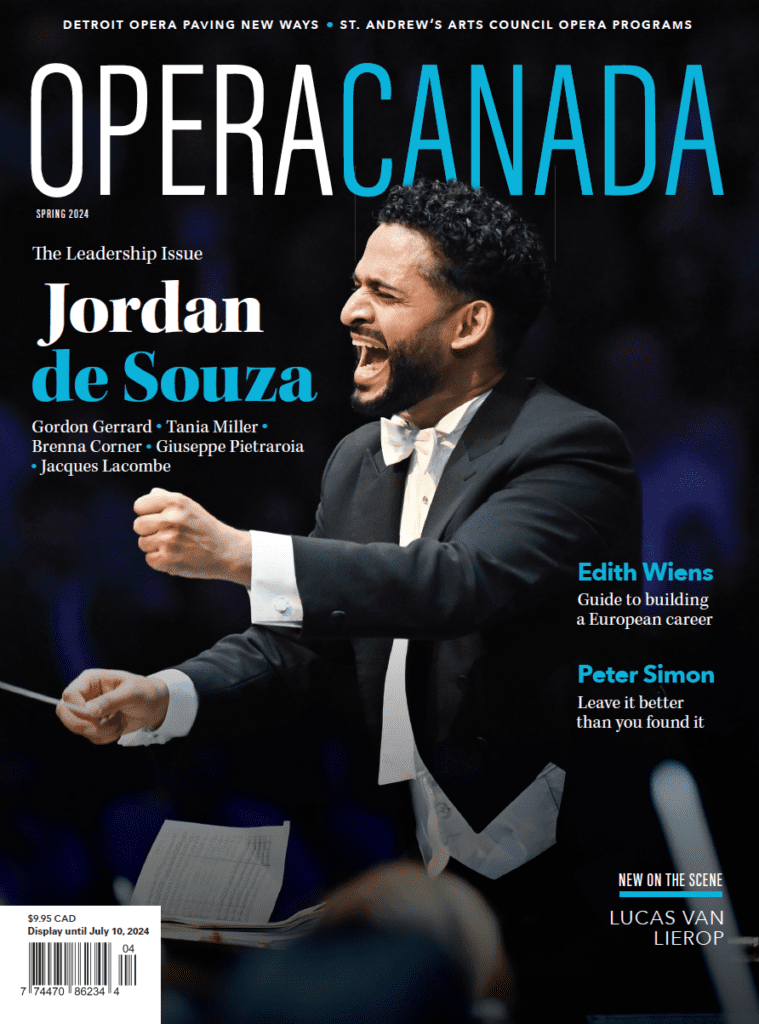Every opera I have ever seen staged by the director/designer team of Renaud Doucet and André Barbe has been visually memorable and Vancouver Opera’s new La Bohème (seen Feb. 16th) is no exception.
Interestingly, their production (originally for Scottish Opera and Theatre St. Gallen in Switzerland), had its origins in a visit Doucet and Barbe made three years ago to Paris’s largest flea market, the Marché aux Puces de Saint-Ouen.
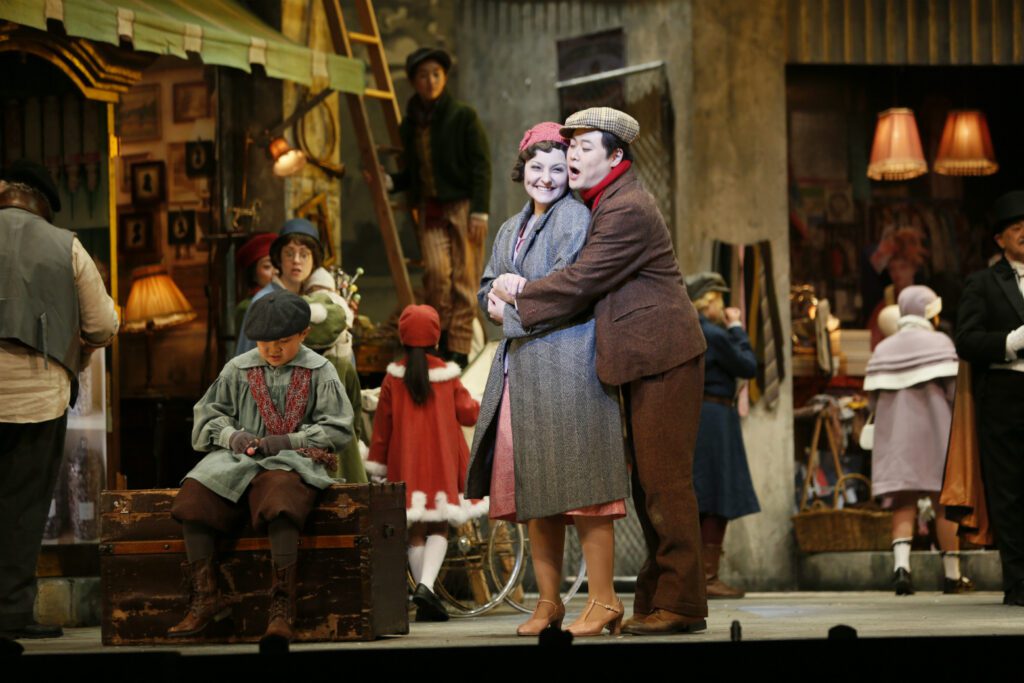
France Bellemare (Mimì) and Ji-Min Park (Rodolfo) in Vancouver Opera’s La Bohème. Photo: Tim Matheson
And that’s where this production begins: in a bustling contemporary Parisian flea market, complete with antique shops, tourists, street vendors, pickpockets, an accordion busker and children running amok. An ailing woman, fascinated with an old phonograph in a shop display, puts on a record and the music transports her back to 1920s Paris where she imagines herself as Mimì in Puccini’s opera …
So far so good, but even the most apt visuals are to no avail if the singing is not up to par. Fortunately, all in this mostly Canadian cast were eminently capable and brought clearly individual personalities to bear on their roles even if the singers playing the opera’s main love interests—Mimì and Rodolfo—might have seemed vocally mismatched at first.
Korean-born tenor Ji-Min Park (a late replacement for fellow Korean Yosep Kang, the cast’s original Rodolfo) has a hugely powerful voice. Québec soprano France Bellemare, on the other hand, is an infinitely more restrained and delicately shaded singer—entirely in keeping with the character of the (in this production) cancer-stricken Mimì.
From the first bars of his “Che gelida manima,” there was no doubt we had a truly compelling and captivating Rodolfo on our hands. Vancouver Opera’s was Park’s hundredth Rodolfo and he endowed the role with a gutsy combination of energy, confidence and passion without ever stretching the bounds of credibility.
The warmth of Bellemare’s voice, though, unmistakably hints at the depth of her character’s inner feelings for Rodolfo. There’s a quiet intensity there that none of Park’s much more robust tenor can overshadow. Bellemare is quite early in her career, but I can see Mimì becoming a signature role for her as she progresses.
The vocal styles of Park and Bellemare are vastly different from one another. Yet somehow, when Park’s vigorous tenor was paired with—or should it be against?—the soprano’s more delicate voice, the effect was poignant and, most importantly, rang true. After all, despite their love for each other, are not the characters of Mimì and Rodolfo hopelessly mismatched? In the final scene, when Mimì inexorably fades away and dies, Rodolfo is the last onstage to know. And Park’s outburst of anguish when his character realizes she has gone was doubly shattering in context.
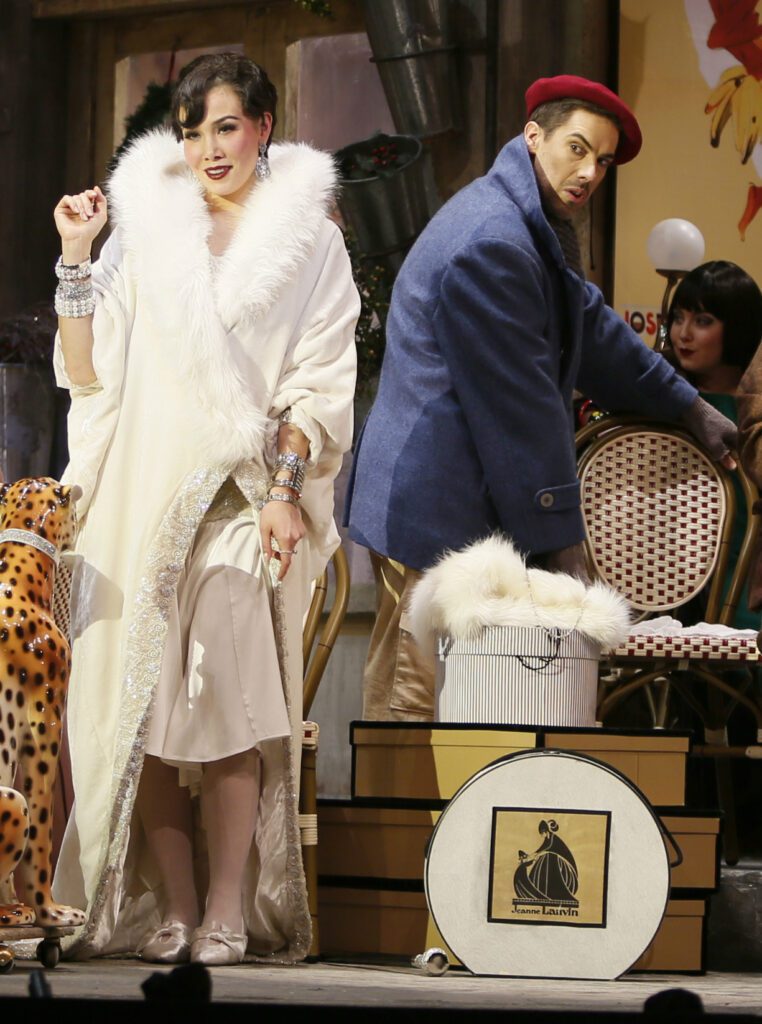
Sharleen Joynt (Musetta) and Phillip Addis (Marcello) in Vancouver Opera’s La Bohème. Photo: Tim Matheson
In classy flapper attire, with swirling white feather boa, soprano Sharleen Joynt captured the attention of the Café Momus clientele as a fearlessly glamorous Musetta in Act II. She tossed off “Musetta’s Waltz” with carefree abandon and it would take a singer of considerable ability and charisma to match her in sheer vocal and stage presence. However, as Marcello, her on-again-off-again lover, baritone Phillip Addis was more than her match. This upped the frisson of their onstage disputes as they generated cascades of sparks during their lovers’ spats.
In her VO debut, Canadian conductor Judith Yan really shone in the pit, bringing extraordinarily lyrical and expressive playing from the Vancouver Opera Orchestra. Yan held the musical thread firmly but synched the ebb and flow of Puccini’s score perfectly with the onstage drama unfolding before the audience’s eyes. The applause swelled noticeably when she appeared onstage to take her bows at curtain.
There was fine work from the Leslie Dala-coached Vancouver Opera Chorus: precise, in tune and, above all, highly expressive.
There were a number of felicitous details throughout the show that added to the verisimilitude of the setting. One of the most telling was Ross Braes, the accordion busker from Act I, in front of the closed curtain for the scenery change between Acts III and IV, lilting out a haunting version of “Musetta’s Waltz.” Very French; very Parisian.
All in all, it turned out to be a visually and vocally memorable Bohème: with this Doucet-Barbe staging and the enormously talented almost-all-Canadian cast, Vancouver Opera managed to give its audience the best of both worlds.

